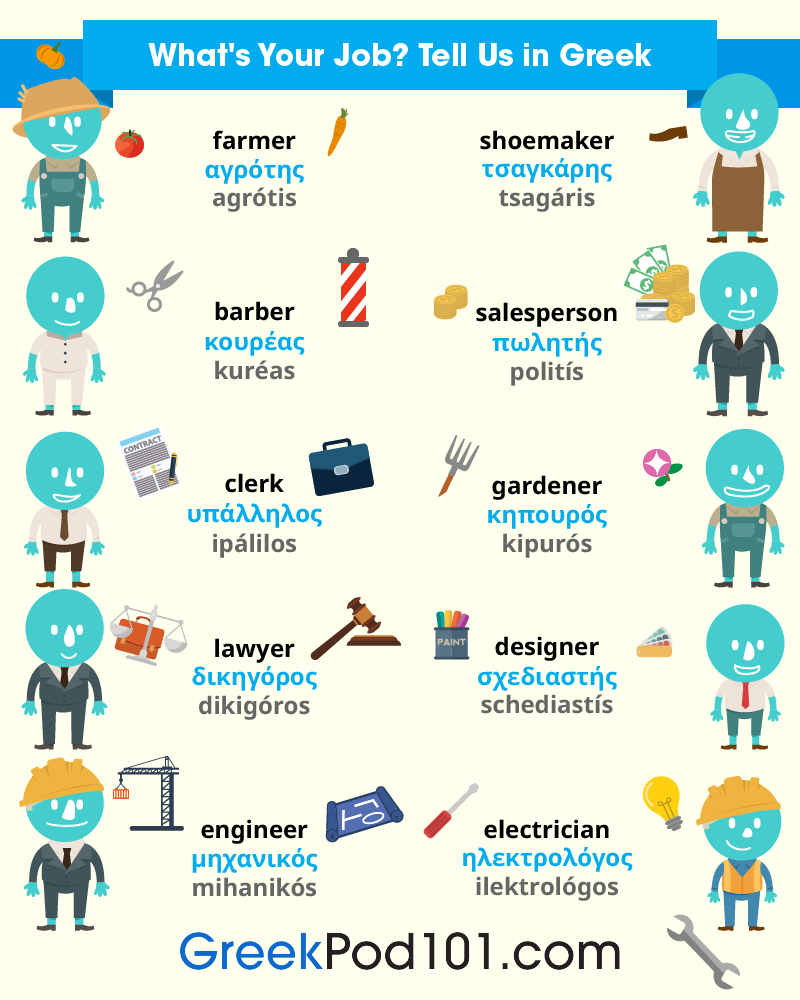
Ever wondered how to use negation in Greek to create negative sentences?
Then you’re in the right place!
If you prefer expressing your opposition verbally (instead of nodding, for instance), then continue reading.
In this blog post, we’ll focus on negation in Greek and show you how to turn an affirmative sentence into a negative one. In addition, we’ll present you with the most common negation words and phrases, as well as the most popular ways to give a negative response to a question.
Are you ready?
Let’s get started!
 Table of Contents
Table of Contents
- Turning an Affirmative Sentence into a Negative Sentence
- Giving a Negative Response to a Question
- Negation Words and Phrases
- Double Negatives
- Conclusion
1. Turning an Affirmative Sentence into a Negative Sentence

Rumor has it that Greek negation is one of the easiest parts of the language to learn.
Modifying an affirmative sentence to have a negative meaning can be achieved by simply adding the particle δεν (den) – “not“ before the verb in the indicative mood.
Here are some typical examples:
| Affirmative Sentence | Negative Sentence |
|
|
| Affirmative Sentence | Negative Sentence |
|
|
| Affirmative Sentence | Negative Sentence |
|
|
When it comes to complex sentences, consisting of two or more clauses connected by the conjunction και (ke) – “and,” the particle “δεν” should be placed before each verb. In that way, you can negate the meaning of both sentences.
| Affirmative Sentence | Negative Sentence |
|
|
However, in cases like this, you may want to negate only the first or second statement. The solution is simple: Just place a “δεν” before the verb you want to negate.
| Negating the 1st Statement | Negating the 2nd Statement |
|
|
2. Giving a Negative Response to a Question

Saying no every once in a while is not a bad thing. Therefore, when you need to answer “no” to a yes-or-no question, you can simply say:
- Greek: Όχι.
- Romanization: Óhi.
- Translation: “No.”
Here’s an example:
| Greek | – Θέλεις να πάμε για καφέ; – Όχι. |
| Romanization | – Τhélis na páme yia kafé? – Óhi. |
| Translation | – “Do you want to go for a coffee?” – “No.” |
Or if you want to be more polite, you may add the verb ευχαριστώ (efharistó) – “to thank” at the end of your response.
| Greek | – Θέλεις να σου φτιάξω έναν καφέ; – Όχι, ευχαριστώ. |
| Romanization | – Τhélis na su ftiáxo énan kafé? – Óhi, efharistó. |
| Translation | – “Do you want me to make you some coffee?” – “No, thank you.” |
Moreover, you can also repeat the verb or the statement of the question using negation instead of a simple “όχι” answer.
| Greek | – Είναι αυτό δικό σου; – Όχι, δεν είναι. |
| Romanization | – Íne aftó dikó su? – Óhi, den íne. |
| Translation | – “Is this yours?” – “No, it isn’t.” |
3. Negation Words and Phrases
You can also make a sentence negative in Greek by using certain words and phrases. In this section, we’ll take a look at some of the most common Greek negation words and phrases, along with examples. These words are normally used in combination with “δεν,” resulting in a sentence with double negatives (which we’ll discuss in the next section of this blog post).

- Greek: ποτέ
- Romanization: poté
- Translation: “never”
| Greek | Δεν έχω πάει ποτέ στην Ελλάδα. |
| Romanization | Den ého pái poté stin Elláda. |
| Translation | “I have never been to Greece.” |
- Greek: πουθενά
- Romanization: pouthená
- Translation: “nowhere”
| Greek | Χθες έβρεχε και δεν πήγαμε πουθενά. |
| Romanization | Hthes évrehe ke den pígame puthená. |
| Translation | “Yesterday, it was raining and we didn’t go anywhere.” |
- Greek: κανείς
- Romanization: kanís
- Translation: “nobody”
| Greek | Κανείς δεν ήρθε στα γενέθλιά μου. |
| Romanization | Kanís den írthe sta yenéthliá mu. |
| Translation | “Nobody came on my birthday.” |
- Greek: τίποτα
- Romanization: típota
- Translation: “nothing”
| Greek | Τίποτα δεν θα μας χωρίσει. |
| Romanization | Típota den tha mas horísi. |
| Translation | “Nothing will tear us apart.” |
- Greek: ούτε…ούτε
- Romanization: úte…úte
- Translation: “neither…nor”
| Greek | Δεν μου αρέσει ούτε το κρασί, ούτε η μπύρα. |
| Romanization | Den mu arési úte to krasí, úte i bíra. |
| Translation | “I like neither wine, nor beer.” |
Last, but not least, we couldn’t omit negative commands. Since the imperative mood in Greek (which is the mood that expresses commands) doesn’t have its own negation form, it uses the negation form of the subjunctive mood: the following particle + the verb in the subjunctive mood.
- Greek: μη(ν)
- Romanization: mi(n)
- Translation: “don’t”
| Greek | Η μαμά κοιμάται. Μη φωνάζεις! |
| Romanization | I mamá kimáte. Mi fonázis!. |
| Translation | “Mommy is sleeping. Don’t yell.” |
If you want to sound more polite, then simply add the verb παρακαλώ (parakaló) – “please” at the end of the negative command.
| Greek | Έχω πονοκέφαλο. Μη μιλάς δυνατά, παρακαλώ. |
| Romanization | Ého ponokéfalo. Mi milás dinatá, parakaló. |
| Translation | “I’ve got a headache. Please, don’t speak loudly.” |
“Μην” can be combined with verbs (as we saw) as well as with active voice participles, which are formed by adding an -οντας or a -ώντας suffix to a verb.
| Greek | Ο ήρωας έπεσε κάτω, μην έχοντας τη δύναμη να συνεχίσει. |
| Romanization | O íroas épese káto, min éhondas ti dínami na sinehísi. |
| Translation | “The hero fell down, not having the strength to continue.” |
4. Double Negatives

In Greek, double negatives only create a positive statement some of the time. It really depends on the choice of words.
Here’s an example of two negations making a positive statement:
| Greek | Δεν θέλω να μην κοιμάσαι. |
| Romanization | Den thélo na min kimáse. |
| Translation | “I don’t want (you) not to sleep.” |
| Meaning | I want you to sleep. |
Nevertheless, sometimes two negations make an even more negative statement. This usually happens with negative Greek words and phrases, like the ones we presented in the previous section of this blog post.
| Greek | Το βιβλίο δεν είναι πουθενά. |
| Romanization | To vivlío den íne puthená. |
| Translation | “The book is nowhere.” |
| Meaning | The book is (very) difficult to find. |
Interestingly, in Greek there are also triple negatives formed by repeating a negation word and including the pledge particle μα (ma) – “ma,” which expresses opposition. In that way, the negation is highlighted even more.
| Greek | Κανείς, μα κανείς δεν θα το μάθει. |
| Romanization | Kanís, ma kanís den tha to máthi. |
| Translation | “Νobody, but nobody won’t learn this.” |
| Meaning | Nobody will find out about this. |
5. Conclusion
Is there a sentence or a phrase that you find difficult to negate? Let us know in the comments below!
As you should have noticed by now, Greek negation is pretty easy to learn and use. In other languages, there are many different ways to form a negation, which often include an auxiliary verb, such as “do” or “don’t” in English.
This is definitely a cornerstone chapter of learning Greek, as negations can be used widely in our everyday lives. With enough studying and practice, you’ll be on your way to mastering Greek negation in no time, and we’ll be here for you every step of the way.
At GreekPod101.com, we aim to provide you with everything you need to know about the Greek language in a fun and engaging way. Blog posts like this one, word lists, grammar tips, and even YouTube videos, are waiting for you to discover them! And if you’d prefer a more customizable learning experience, you can upgrade your account to use our MyTeacher service, which will allow you to ask all your questions to your own personal native Greek teacher. Don’t forget to join our online community and discuss the lessons with other students!
Create your free, lifetime account today.

How Long Does it Take to Learn Greek?
A Useful Guide for Beginners

How long does it take to learn Greek? Is Greek a difficult language to master? How can I learn Greek fast?
These questions (and many more) might pass through your mind as you set out to start learning Greek. Is there a definite answer to all of them? Well, actually no.
However, by the time you’re done reading this blog post, you’ll have a clearer understanding of what it takes to achieve the different levels of Greek fluency. You’ll also walk away with useful tips on how to learn the Greek language more effectively and speed up your progress.
 Table of Contents
Table of Contents
- Is Greek a Difficult Language?
- How Long Does it Take to Achieve a Beginner Level?
- How Long Does it Take to Achieve an Intermediate Level?
- How Long Does it Take to Achieve an Advanced Level?
- How Can I Learn Greek Faster?
- Conclusion
1. Is Greek a Difficult Language?
Rumor has it that Greek is difficult to learn. But does this statement correspond to reality?

Well, it’s not super-easy. That’s for sure.
Greek is not a Romance language, meaning it does not make use of Latin characters. Although that fact alone might intimidate new learners, the reality is more encouraging. Greek is considered a stand-alone branch of the Indo-European language family, and it has heavily influenced almost every major European language. This is mainly because modern European civilization stems from Ancient Greek civilization.
As a result, there are many words in English (and in European Romance languages) that were originally Greek. In addition, Greece has always been in touch with other European countries, creating cultural and commercial bonds. Therefore, the Greek language also contains many originally foreign words (from French, Italian, English, etc.).
The Greek alphabet shares many common characteristics with the English alphabet, though it also includes some unique features. The similarities, however, make learning Greek even easier.
Even from a phonetic perspective, many people state that Greek sounds a bit like Spanish, Italian, or Portuguese. Therefore, it doesn’t sound that extraordinary to American and European ears.
At this point, we should note that the difficulty you’ll have learning Greek highly depends on your mother tongue, as well. For example, some people from Asian, Arab, or African countries find it harder to adjust because their mother tongue is far more different from Greek than European languages are.
All in all, if you’re still looking for an accurate answer here, it is: No, Greek is not that hard to learn!
Below, we’ll take a look at how long it takes to learn Greek based on the level of knowledge you’re aiming for.
2. How Long Does it Take to Achieve a Beginner Level?
| Time to achieve | Taking as a reference the requirements of the A1 level on the CEFR scale, you will need approximately 100-120 hours of study. |
| What you will learn at this level | The learner will have the ability to communicate with native speakers at a basic level. He or she will be able to…
|
| Example lesson | Speaking Perfect Greek at a Restaurant |
3. How Long Does it Take to Achieve an Intermediate Level?
| Time to achieve | Taking as a reference the requirements of the B1 level, you will need approximately 180-250 hours of study. |
| What you will learn at this level | The learner will be able to communicate at an intermediate level, on the following subjects: Daily transactions
|
| Example lesson | Making an Appointment in Greek |
4. How Long Does it Take to Achieve an Advanced Level?
| Time to achieve | Taking as a reference the requirements of the C1 level, you will need approximately 400-520 hours of study. |
| What you will learn at this level | The learner will be able to communicate at an advanced level. This simply means that the student should be able to express his/her views on a wide variety of subjects, speaking without long disruptions and communicating effectively with public and private services for a wide variety of transactions. In addition, at this level, the learner has gained some knowledge of the Greek culture. |
| Example lesson | Top 10 Greek Holidays and Festivals |
5. How Can I Learn Greek Faster?

In the modern world, our daily routines are getting faster and faster as we try to serve many different roles throughout the day. That being said, our daily tasks often leave limited time (if any) for our hobbies, let alone learning a new language.
Learning a new language, however, doesn’t have to take up much time within your daily schedule. The key is to find smart ways to practice—and why not even entertain yourself at the same time?
Here are a few ways to learn Greek fast:
- Watch Greek-Related Netflix Shows
Although Netflix does not include much Greek-language content, there are many series and movies that are related to Greek history, mythology, or general lifestyle. These shows provide the perfect opportunity to take a step closer to the Greek culture, even if you don’t know a single word of Greek.

- Watch Greek Movies
Even if you’re not sure whether you want to pick up a new language, watching some Greek movies is the perfect way to test the waters. Greek cinematography includes movies of many genres and themes, so you’re sure to find a Greek movie that interests you.
Tip: If you’re a complete beginner, watch the movie with English subtitles. This will familiarize you with how Greek sounds and may help you pick up some phrases. Later on, as you start learning Greek and making progress, you may switch to Greek subtitles (or no subtitles at all!).

- Watch Greek YouTube Channels
Another great way to speed up your Greek learning is to watch Greek YouTube videos. These videos don’t have to be exclusively educational. There are many Greek channels covering a range of topics, from infotainment to travel and from Greek songs to famous Greek YouTubers commenting on a wide variety of subjects. One thing is for sure: You’ll be able to get yourself involved in the Greek language and culture much easier this way!
- Read Greek Books
If you’re a bookworm and an intermediate Greek learner, it might be a good idea to start reading Greek books. Your options are literally endless, and you’ll be able to enhance your vocabulary quickly and easily.
Tip: If you’re a beginner, then children’s books might be just perfect, since they use basic vocabulary and simple sentences.

- Place Post-It Notes Around the House
Wondering how to learn Greek vocabulary when you’re short on time? Write some Greek words and phrases on Post-It notes and place them strategically around the house—you’ll be surprised how much faster you can learn Greek this way. We tend to learn faster when we’re actively involved with the language, so what could be better than reviewing the Greek names of basic objects again and again without even noticing?
➜ Tip: Change the Post-It notes regularly in order to learn even more words and phrases.
- Switch Your Smartphone’s Menu to Greek
If you have an understanding of the basics of the Greek language, then the key to speeding up your learning progress might be as simple as switching your smartphone’s menu to Greek. This might seem annoying at first, but you’ll soon realize the benefits of reading Greek on a daily basis.
- Invest in a Greek Language Learning App
One of the best ways to learn a new language on the go is to utilize a language learning app like the one offered by GreekPod101.com.
Conclusion
Learning Greek is not as hard as you might have thought after all, right?
As long as you find ways to incorporate Greek language learning into your everyday routine, you’ll be able to understand Greek in no time.
What’s your favorite way to learn a new language? Let us know in the comments below!
Did you know you could begin learning Greek right now in an easy and fun way? Well, now you do! Create your free lifetime account on GreekPod101.com today!
GreekPod101 offers you high-quality, practical materials and lessons covering everything about the Greek language and culture. We aim to provide you with valuable lessons that will keep you interested and engaged from day one. Stay tuned for more articles like this one, word lists, grammar tips, and even YouTube videos—all this and more are waiting for you to discover them!

Greek Proverbs: Little Pearls of Wisdom

Some people say that proverbs are the accumulated wisdom of a culture. Indeed, most Greek proverbs can be used in a wide variety of situations and can really make a difference when used at the right moment. Greek proverbs also incorporate many cultural elements, so studying them is a great way to dive deeper into the Greek culture and expand your vocabulary.
In this blog post, we’ll present you with the most popular Greek proverbs, along with their translations and meanings. Feel free to use them while chatting with your Greek friends—it’s sure to impress them!
 Table of Contents
Table of Contents
- Animal-Related Greek Proverbs
- Greek Proverbs About Time
- Greek Proverbs About Education & Language
- Greek Proverbs About Caution
- Miscellaneous Greek Proverbs
- Conclusion
1. Animal-Related Greek Proverbs

Sometimes, we can see aspects of our own lives reflected in the animal world. Here are a few popular Greek proverbs featuring animals—can you relate to any of these?
| Greek Proverb | Είπε ο γάιδαρος τον πετεινό κεφάλα. |
| Romanization | Ípe o gáidaros ton petíno kefála. |
| Translation | “The donkey called the rooster big-headed.” |
| Notes | The word πετεινός (petinós) is a synonym of κόκορας (kókoras), both meaning “rooster.” Nowadays, it’s more common to use the latter. |
| Context of Usage | This proverb is often said between friends in a humorous context, when the one is mocking the other about a characteristic that the two share. |
| Greek Proverb | Όταν λείπει η γάτα, χορεύουν τα ποντίκια. |
| Romanization | Ótan lípi i gáta, horévun ta podíkia. |
| Translation | “When the cat’s away, the mice dance.” |
| Notes | In Greek, it’s common to use the word λείπω (lípo) as an equivalent of “to be away.” Literally, in other cases, it may also be translated as “to miss” or “to be missed.” |
| Context of Usage | Imagine taking care of a younger sibling for a while when your parents are away. When the child realizes that the parents are gone, (s)he starts to do all the “forbidden” things, such as eating a lot of chocolate or being extremely loud. In cases like this, you could use the proverb. |
| Greek Proverb | Η καμήλα δεν βλέπει την καμπούρα της. |
| Romanization | I kamíla den vlépi tin kabúra tis. |
| Translation | “The camel can’t see its own hump.” |
| Context of Usage | You might use this saying when someone is harshly criticizing someone else, without thinking of their own disadvantages or faults. |
| Greek Proverb | Εγώ το είπα στον σκύλο μου και ο σκύλος στην ουρά του. |
| Romanization | Egó to ípa ston skílo mu ke o skílos stin urá tu. |
| Translation | “I said this to my dog and my dog said it to its tail.” |
| Context of Usage | Someone could say this when your mother asks you to do something, and you then make someone else do it instead. |
| Greek Proverb | Όσα δεν φτάνει η αλεπού, τα κάνει κρεμαστάρια. |
| Romanization | Ósa den ftáni i alepú, ta káni kremastária. |
| Translation | “What the fox cannot reach, it turns them into hangers.” |
| Context of Usage | This proverb refers to a situation where someone tends to derogate someone else’s achievements because, deep down inside, they know they can’t achieve the same things. This phrase is most commonly used in an ironic tone. |
| Greek Proverb | Ένας κούκος δεν φέρνει την άνοιξη. |
| Romanization | Énas kúkos den férni tin ánixi. |
| Translation | “A cuckoo bird does not bring the spring.” |
| Context of Usage | This proverb might be used when someone sees a positive indication of something and quickly believes that the end result will also be positive. |
➤ Learn more about animals’ names in Greek by studying our relevant vocabulary list or our video on Common Animals in the Park.
2. Greek Proverbs About Time

Our lives are encompassed by time, and this fact has drawn much speculation from great thinkers and entire societies the world over. Below are some common Greek-language proverbs on the topic of time.
| Greek Proverb | Ο χρόνος είναι ο καλύτερος γιατρός. |
| Romanization | O hrónos íne o kalíteros yatrós. |
| Translation | “Time is the best doctor.” |
| Context of Usage | When a friend of yours gets hurt or breaks up with their partner, you could say this phrase to make him or her feel better. |
| Greek Proverb | Το καλό πράγμα αργεί να γίνει. |
| Romanization | To kaló prágma aryí na gíni. |
| Translation | “The good thing takes time to happen.” |
| Context of Usage | You might use this proverb when a friend of yours grows disappointed about the progress of his plans. It would be an encouraging way to say that everything will be great in the long run. |
| Greek Proverb | Κάλλιο αργά παρά ποτέ. |
| Romanization | Kálio argá pará poté. |
| Translation | “Better late than never.” |
| Notes | The word κάλλιο (kálio) is a rarely used informal version of the adverb καλύτερα (kalítera), both meaning “better.” |
| Context of Usage | Let’s say your mother decides to go back to school in order to follow her dreams. It’s obviously better to do something later in life than to not do anything at all. |
| Greek Proverb | Όποιος δεν θέλει να ζυμώσει, δέκα μέρες κοσκινίζει. |
| Romanization | Ópios den théli na zimósi, déka méres koskinízi. |
| Translation | “Whoever does not want to knead, sifts for ten days.” |
| Context of Usage | You might say this to motivate a friend of yours who’s procrastinating to take action. |
| Greek Proverb | Αγάλι-αγάλι γίνεται η αγουρίδα μέλι. |
| Romanization | Agáli-agáli yínete i agourída méli. |
| Translation | “The unripe grape becomes sweet like honey slowly-slowly.” |
| Notes | The phrase αγάλι-αγάλι (agáli-agáli) means “slowly-slowly.” |
| Context of Usage | This proverb would be encouraging to say to a friend who’s disappointed with the progress of their plans. It would reassure them that they will achieve their goals. |
| Greek Proverb | Μάτια που δεν βλέπονται γρήγορα λησμονιούνται. |
| Romanization | Mátia pu den vlépode grígora lismoniúde. |
| Translation | “Eyes that don’t see each other frequently are soon forgotten.” |
| Notes | The verb λησμονώ (lizmonó) is not that common and we could say that it hasn’t got an exact equivalent in English. It’s something between “to forget (someone or something)” and “to fade into oblivion.” |
| Context of Usage | Imagine if you used to hang out with a friend every day, but as soon as one of you goes abroad for a long period, you don’t even text or think of each other much. |
➤ Memorizing these time-related proverbs will be an impressive feat, but don’t stop there. Learn how to tell the time in Greek today!
3. Greek Proverbs About Education & Language

Education and learning have long been an integral part of Greek life, with formal schooling dating back to Ancient Greece. Here are just a few Greek proverbs and sayings on the topic!
| Greek Proverb | Η γλώσσα κόκαλα δεν έχει και κόκαλα τσακίζει. |
| Romanization | I glósa kókala den éhi ke kókala tsakízi. |
| Translation | “The tongue has no bones but it crushes bones.” |
| Notes | In Greek, we usually say σπάω κόκαλα (spáo kókala), meaning “to break bones.” This is a special occasion where the verb τσακίζω (tsakízo) is used instead. |
| Context of Usage | This is often said when someone says really hurtful words to another person. |
| Greek Proverb | Τα πολλά λόγια είναι φτώχεια. |
| Romanization | Ta polá lógia íne ftóhia. |
| Translation | “Many words are poverty.” (“Silence is golden.”) |
| Notes | Literally, the word φτώχεια (ftóhia) means “poverty.” Greeks appreciate getting the message across with as few words as possible. |
| Context of Usage | You might say this when someone keeps babbling without getting to the point. |
| Greek Proverb | Άνθρωπος αγράμματος, ξύλο απελέκητο. |
| Romanization | Ánthropos agrámatos, xílo apelékito. |
| Translation | “Illiterate man, row wood.” |
| Context of Usage | This saying is used to describe someone who is ignorant due to lack of education. It’s considered an insult, so use it carefully. |
| Greek Proverb | Δάσκαλε που δίδασκες και νόμο δεν εκράττεις. |
| Romanization | Dáskale pu dídaskes ke nómo den ekrátis. |
| Translation | “Oh, teacher that you taught but you don’t implement your teachings.” |
| Notes | The verb εκράττεις (ekrátis) is an older form of the verb κρατώ (krató), meaning “to hold” or “to keep.” |
| Context of Usage | You could use this saying when a friend of yours does not implement his own advice. |
4. Greek Proverbs About Caution

While it’s good to look for the best in people and to make the most of every situation, it’s also crucial to practice caution and common sense. Below are a few common Greek proverbs used to advise caution.
| Greek Proverb | Ο διάβολος έχει πολλά ποδάρια. |
| Romanization | O diávolos éhi polá podária. |
| Translation | “The devil has many legs.” |
| Notes | This phrase aims to highlight that evil can take many forms. |
| Context of Usage | When a friend of yours has just faced a difficult situation and thinks that it’s totally over, you could advise him to keep alert by using this phrase. |
| Greek Proverb | Όπου ακούς πολλά κεράσια, κράτα μικρό καλάθι. |
| Romanization | Ópu akús polá kerásia, kráta mikró kaláthi. |
| Translation | “When you hear about many cherries, hold a small basket.” |
| Context of Usage | When a friend of yours gets overly excited about an event or an opportunity, you might want to tell him to be more cautious and not to expect too much. |
| Greek Proverb | Όποιος βιάζεται σκοντάφτει. |
| Romanization | Ópios viázete skondáfti. |
| Translation | “Whoever is in a hurry stumbles.” |
| Context of Usage | When a friend of yours is doing something in a hurry that requires concentration and attention to detail, you might use this proverb to warn them that the end result will not be good. |
| Greek Proverb | Όταν καείς από τον χυλό, φυσάς και το γιαούρτι. |
| Romanization | Ótan kaís apó ton hiló, fysás ke to yaúrti. |
| Translation | “When you get burned by porridge, you also blow the yogurt.” |
| Context of Usage | This proverb is used to describe someone who has already faced some difficult situations and gotten hurt. Now, when a seemingly good situation arises, that person will continue to act cautious to avoid being hurt again. |
5. Miscellaneous Greek Proverbs

| Greek Proverb | Έξω από τον χορό πολλά τραγούδια λέγονται. |
| Romanization | Éxo apó ton horó polá tragúdia légode. |
| Translation | “Outside the dance-circle many songs are sung.” |
| Notes | This phrase is inspired by Greek celebrations, which often include group dancing in a circle. |
| Context of Usage | You might say this phrase after someone gives advice on a difficult situation they’ve never experienced. |
➤ Interested in Greek music? Take a look at the Top 10 Greek Songs.
| Greek Proverb | Οι πολλές γνώμες βουλιάζουν το καράβι. |
| Romanization | I polés gnómes vuliázun to karávi. |
| Translation | “Too many opinions sink the boat.” |
| Context of Usage | This saying refers to a group of people who are trying to make a decision, but each person has a different opinion. It’s usually said by someone who undertakes to find the option that’s best for everyone. |
| Greek Proverb | Σπίτι μου, σπιτάκι μου και σπιτοκαλυβάκι μου. |
| Romanization | Spíti mu, spitáki mu ke spitokaliváki mu. |
| Translation | “My home, my sweet home, my sweet hut.” |
| Notes | This phrase is equivalent to the English phrase, “Home, sweet home.” |
| Context of Usage | Coming home after a long time away will definitely make you want to say this phrase. |
➤ Wondering how to describe your home’s interior in Greek? Take a look at our relevant vocabulary list for some useful words!
| Greek Proverb | Αγαπά ο Θεός τον κλέφτη, αγαπά και τον νοικοκύρη. |
| Romanization | Agapá o Theós ton kléfti, agapá ke ton nikokíri. |
| Translation | “God loves the thief, but He also loves the homeowner.” |
| Notes | This proverb aims to highlight that evil might take over temporarily, but good reigns in the end. |
| Context of Usage | Next time you’re referring to someone who does not act appropriately, you could use this phrase to express that he’ll get discovered or punished eventually. |
| Greek Proverb | Από αγκάθι βγαίνει ρόδο και από ρόδο αγκάθι. |
| Romanization | Apó angáthi vyéni ródo ke apó ródo angáthi. |
| Translation | “A rose comes out of a thorn and a thorn comes out of a rose.” |
| Notes | This phrase presents the general truth that a person should not be characterized as good or bad based on their parents’ character. |
| Context of Usage | This would be an apt phrase to use when a very talented child is born to not-so-talented parents, or vice-versa. |
| Greek Proverb | Κράτα με να σε κρατώ να ανεβούμε το βουνό. |
| Romanization | Kráta me na se krató na anevúme to vunó. |
| Translation | “Hold my hand and I’ll hold yours so we can climb the mountain.” |
| Notes | This proverb is here to remind us that cooperation results in greater achievements. |
| Context of Usage | You could say this when you have a very difficult group assignment, but you want to encourage your partners. |
| Greek Proverb | Μπρος γκρεμός και πίσω ρέμα. |
| Romanization | Bros gremós ke píso réma. |
| Translation | “Cliff in front and stream behind.” |
| Notes | The word μπρος (bros) is an informal, shortened version of the word εμπρός (embrós), meaning “in the front.” |
| Context of Usage | You could say this when you feel trapped in a dilemma and the choices you have available seem to be equally bad. |
| Greek Proverb | Το μήλο κάτω από τη μηλιά θα πέσει. |
| Romanization | To mílo káto apó ti miliá tha pési. |
| Translation | “The apple will fall right below the apple tree.” |
| Context of Usage | When a child has inherited a skill or a bad habit from their parents, you could use this phrase in order to state that it was to be expected. |
➤ Speaking of apples, here are the names of more Fruits and Vegetables in Greek!
| Greek Proverb | Η καλή μέρα από το πρωί φαίνεται. |
| Romanization | I kalí méra apó to proí fénete. |
| Translation | “You can tell a good day from the morning.” |
| Context of Usage | Pessimists often say this phrase when something bad happens early in the morning, believing that more bad things will come later in the day. This use denotes sarcasm, but it could also be used in a non-sarcastic way when something good happens. |
| Greek Proverb | Έγιναν από δυο χωριά χωριάτες. |
| Romanization | Éyinan apó dio horiá horiátes. |
| Translation | “They became villagers from two different villages.” |
| Context of Usage | This saying refers to two people who have quarrelled so much that they don’t talk to each other anymore. It’s also used simply to underline the intensity of an argument. |
6. Conclusion
Now you have at your fingertips some of the most popular Greek proverbs to memorize. By studying them, you’ll gain more fluency as well as a better understanding of Greek culture as a whole.
Do you know any other Greek proverbs? Which one is your favorite?
GreekPod101.com offers you high-quality, practical knowledge about the Greek language and culture. We aim to provide you with everything you need to know about the Greek language in a fun and interesting way. Stay tuned for more articles like this one, word lists, grammar tips, and even YouTube videos.
Until next time, happy learning!

Visit Athens, the Cradle of Western Civilization

Locals often refer to Athens as the “cradle of Western civilization.” And who could blame us? With a vast and rich history of more than 5,000 years, this is the place where democracy was born—an invaluable gift to modern society.
Whether or not you’re planning to visit Athens soon, this city definitely deserves a place on your bucket list.
In this brief Athens travel guide, we’ll share with you valuable travel tips, a range of incredible places you must visit here, and the ten most useful survival phrases in Greek.
 Table of Contents
Table of Contents
- Travel Tips
- Must-See Places for a 1-3 Day Trip
- Highly Recommended Places for a 4-7 Day Trip (or Longer)
- Greek Survival Phrases for Travelers
- Conclusion
1. Travel Tips
Athens is one of the world’s oldest cities, the Greek capital, and—with more than three million inhabitants—certainly the biggest city in Greece. It lies almost in the center of the country and it connects with almost all the major cities, either by land or by various means of transportation.
Language
Although the official language is obviously Greek, the majority of people here speak fluent English. Even if you don’t know any Greek, you’ll be able to communicate, ask for information or directions, read labels and signs, and even choose your favorite dish at a local restaurant.
However, locals highly appreciate tourists who know even a little bit of Greek; nothing will put a smile on their faces faster than hearing you try out some basic phrases. Even if you’re just starting to experiment with Greek, feel free to practice. This will take you a step closer to the culture and help you dive into the rich history held in almost every corner of the city.
Getting Around
Athens, like any other modern European capital, offers a complex network of transportation. You can get around via the metro, trains, trolleys, buses, and even trams.
Nevertheless, the best way to get around is definitely by metro, which is one of the newest installations in Europe. You can travel fast and easily to all of the major sights in the historical center, while at the same time admiring some ancient ruins which were brought to light by archaeological excavations. Monastiraki Station, in particular, is a true gem; here, you can see whole sections of the old city of Athens in specially designed showcases.
When it comes to the other means of transportation, please keep in mind that small delays are almost guaranteed.
Accomodation
If you’re visiting for a short period of time, the best place to stay is within the borders of the historical center of the city. This includes areas such as Plaka, Thiseio, Omonia, Akadimias, Akropolis, Panepistimiou, and Monastiraki. Staying in these areas will allow you to access all the major sights by foot, thus maximizing your time! Other popular neighborhoods beyond the historical center are Gazi, Koukaki, Kifisia, Glyfada, and Kypseli.
The average cost of a standard double room within the city center is around 60€. But if you’re lucky, you’ll be able to find plenty of private Airbnb apartments for the same price.
Food
Oh, the food! Athens is a foodie’s paradise! At almost every corner, you may find something delicious to eat. The options are endless: traditional bakeries; restaurants; tavernas; American-style fast food restaurants; pizza places; souvlaki places; ethnic restaurants offering Chinese, Indian, and Libanese specialties; and more.
The average cost of a meal at a restaurant is 13€/person, often served with a refreshment or a glass of wine. However, there are many cheaper options, with a traditional pita with gyros costing around 3,00€. In other words, regardless of your budget, you won’t go hungry in Athens.
Packing Reminders
The climate in Athens is temperate and typical of a Mediterranean city. Summers are hot and winters are pretty mild. That being said, we recommend that you pack the following must-have items for your visit to Athens:
- A hat & sunglasses
- Comfy shoes
- Comfy clothes
- A light jacket (depending on the season)
- Mosquito spray
2. Must-See Places for a 1-3 Day Trip
Here are some incredible attractions in Athens you shouldn’t miss if you only have a few days to visit.
Ακρόπολη (Akrópoli) – “Acropolis”

The sites on the Acropolis include the Propylaea, the Temple of Athena Nike, the Parthenon, and the Erechtheion. On the slopes located on the south side of the Acropolis, you’ll find the Odeon of Herodes Atticus and the Theater of Dionysus.
Now you might be wondering which of these places are worth a visit. The answer is simple: All of them!
Make sure you have enough time to stare at every little detail of these architectural masterpieces. Climb the hill to visit the Parthenon and then take a stroll around the other sites. Don’t forget to also pay a visit to the nearby Museum of Acropolis, as well as the National Archaeological Museum where unique specimens from all over this area are kept.
All public areas of the National Archaeological Museum are accessible by wheelchair and all of the Museum’s levels have elevator access and toilets for individuals with mobility disabilities. The Acropolis also provides wheelchair-friendly access. However, it’s probably a good idea to take a taxi to the entrance, in order to avoid the hill.
Πλάκα (Pláka) – “Plaka”

Right below the Acropolis and its impressive ancient masterpieces lies hillside Plaka—an old but well-kept neighborhood of Athens. Its picturesque streets are full of tiny shops selling jewelry, clothes, and local ceramics.
Sidewalk cafés and family-run tavernas stay open until late. It’s the perfect opportunity to enjoy a couple of beers and taste some authentic Greek cuisine. In addition, the whitewashed homes of the Anafiotika neighborhood give an island-feel to this area.
If you have some time to spare, you might want to consider visiting the following locations:
Σύνταγμα (Síndagma) – “Syntagma Square”

The Greek Parliament is located in the center-most square of this modern Athens city. The national guard is called “Evzones,” and they stand in front of the Parliament and the iconic Tomb of the Unknown Soldier. It’s definitely worth waiting around for the changing of the guards, which happens every hour of every day. There is an official ceremony each Sunday morning at 11:00 which shows the full grandiosity of the event.
Another interesting activity is taking a free tour of the Parliament house, where you’ll be able to get in touch with modern Greek history and politics.
The Syntagma Square is also where the busiest shopping street (Ermou Street) begins, which leads us to our next sight: Monastiraki.
Μοναστηράκι (Monastiráki) – “Monastiraki”

Lively Monastiraki is home to many landmarks, including Ancient Agora and the ruins of Hadrian’s Library. The Monastiraki flea market is a jumble of shops selling artisanal soaps, handmade sandals, souvenir T-shirts, and hundreds of other things. All around, you’ll find an array of tavernas and restaurants where you can take a seat and enjoy a taste of Athens whilst taking in some spectacular views of the Acropolis.
3. Highly Recommended Places for a 4-7 Day Trip (or Longer)
If you’re staying in Athens for more than a couple of days, then you may enjoy some of the following popular sights.
The Planetarium at the Eugenides Foundation
Get lost in a modern educational place, where you can take a deep dive into space and time. A visit to the Planetarium almost guarantees a day well spent for the entire family.
The Stavros Niarchos Foundation Cultural Center
A true gem in the area of Kallithea, the Stavros Niarchos Foundation is a great place for an evening stroll in the surrounding olive tree park. Take a look at their website and look for any painting exhibitions, music nights, or other activities taking place during your stay.
The Goulandris Natural History Museum
If you want to learn a bit more about Greece’s zoological, botanical, marine, rock, mineral, and fossil specimens, then this is the place to be. It’s a child-friendly environment, where you’ll learn a lot of interesting information about the natural history of Greece.
The Museum of Cycladic Art
Have you ever wondered where Ancient Greeks stored their wheat during the Bronze Age? In the Museum of Cycladic Art, you’ll have the unique opportunity to lay your eyes on everyday objects dating back to 3200 BCE. From statues to Ancient Greek jewelry, you’ll find many fascinating items in this collection.
Thiseio Area
If you want to visit Athens by night, head over to Thiseio Area which lies just under the lights of the Acropolis. Here you can indulge in an aperitivo, a cocktail, or a glass of wine while taking in its incomparable views. In this scenic pedestrian site, you can find famous rooftop bars and traditional wine & meze corners. It’s easily accessible through the metro network (stations Acropolis or Thiseio), making it possible to enjoy this spot wherever you decide to stay.
Gazi Neighborhood
If you’re up to some Greek clubbing, Gazi is the place to be. It’s a former industrial area that has been transformed into a meeting point for locals who enjoy a late-night drink. The neighborhood offers a wide variety of cafeterias, bars, and late-night clubs for you to choose from. It’s easily accessible through the metro network (Gazi Station), but be aware that the metro is available until midnight Sunday through Thursday and until 2 a.m. on Friday and Saturday; it starts operating again at around 5 a.m.
In this area, you may also enjoy Technopolis, an industrial museum of modern architecture. Today, it functions as a multipurpose cultural center, and it features a variety of seasonal exhibits.
4. Greek Survival Phrases for Travelers

If you plan on visiting Athens, you should first learn the very basics of Greek.
And that’s what we’re here for!
Below, you’ll find the top ten Greek survival phrases for travelers.
- Greek: Γεια.
- Romanization: Υá.
- Translation: “Hello.”
- Greek: Ευχαριστώ.
- Romanization: Efharistó.
- Translation: “Thank you.”
- Greek: Γεια. / Αντίο.
- Romanization: Υá. / Adío.
- Translation: “Goodbye.”
- Greek: Συγγνώμη.
- Romanization: Signómi.
- Translation: “Sorry.” / “Excuse me.”
- Greek: Πολύ ωραία.
- Romanization: Polí oréa.
- Translation: “Very good.”
- Greek: Δεν καταλαβαίνω ελληνικά.
- Romanization: Den katalavéno eliniká.
- Translation: “I don’t understand Greek.”
- Greek: Πού είναι η τουαλέτα;
- Romanization: Pu íne i tualéta?
- Translation: “Where is the restroom?”
- Greek: Πόσο κοστίζει;
- Romanization: Póso kostízi?
- Translation: “How much does it cost?”
- Greek: Θέλω αυτό.
- Romanization: Thélo aftó.
- Translation: “I want this.”
- Greek: Βοήθεια!
- Romanization: Voíthia!
- Translation: “Help!”
To learn more useful travel phrases or to practice your pronunciation, please take a look at the following resources on GreekPod101.com:
- Blog Post: How to Say Hello in Greek
- Vocabulary List: Common Ways to Say Hello
- Blog Post: How to Introduce Yourself in Greek
- Vocabulary List: 10 Lines to Introduce Yourself
Conclusion
Anything we could say about Athens is probably not enough. It might be a big city, but it’s full of magic at every corner.
Whether you’re a history enthusiast, a food-lover, or a nightlife seeker, Athens will definitely fascinate you.
Did you know that you can take another step closer to the Greek culture by learning Greek online, easily and effectively from your home?
That’s exactly what we’re here for!
Join GreekPod101.com for a free lifetime account and start learning Greek today.
Before you go, let us know in the comments which of these locations you want to visit most and why! We look forward to hearing from you.

English Words in Greek You Should Know


Did you know that learning Greek will involve coming across many familiar English words?
Well, since Greece is a member of the European Union and one of the top tourist destinations in the Mediterranean, it’s not surprising that the majority of Greeks speak fluent English. In addition, English lessons are integrated into the educational curriculum, so Greek children familiarize themselves with the language from a very young age.
Within this context, there are many English words in Greek that are used in everyday communication. In some cases (such as when technology-related terminology is used), these borrowed English words are even preferred over their Greek equivalents.
As technology has continued to thrive over the past few decades, a new, informal version of written—or better said, typed—Greek has emerged, widely known as Greeklish. As you might already know, Greek is not a Romance language, so being able to type in Greek using an English keyboard facilitated digital communication.
In this blog post, we’ll take a look at the different versions of Greeklish as well as some common English words used in the Greek language. In addition, we’ll introduce you to plenty of English words which are derived from Greek.
- → Before you start, you may also enjoy our article on 10 Unique and Untranslatable Greek Words!
 Table of Contents
Table of Contents
- Introduction to Greeklish
- Greeklish Examples
- Loanwords vs. Greeklish
- English Words Derived From Greek
- Conclusion
1. Introduction to Greeklish
‘Greeklish’ is a portmanteau word that combines the words Greek and English. This term refers to the tendency of native speakers to type Greek with Latin characters.
The first use of Greeklish is believed to have been by the Hellenic National Meteorological Service (Ε.Μ.Υ.), during times when Greek characters were not fully supported in systems or in the digital world. However, there is no official record as to when exactly Greeklish made its first appearance.
One thing is sure, though: Greeklish has flourished among youngsters, along with the development of technology. For example, one of the first uses of Greeklish was in SMS messages, mainly due to the character restrictions. Typing in Greek would require more characters for certain vowel and consonant sounds, such as: αι > e and ντ > d. Later, the use of Greeklish expanded to all digital communications, where passing on a message quickly was more important than spelling and taking the time to accentuate words.

We could say that there are two distinctive styles of Greeklish:
- Phonetic: Writing the words with Latin characters, according to the way they sound. For example, μπαμπάς > babas.
- Spelling-based: Writing the words with Latin characters, taking into account the Greek spelling and transliterating them on a letter-by-letter basis. For example, μπαμπάς > mpampas.
However, most people who use Greeklish have a mixed style, with some words being typed according to their spelling and other words being typed according to their sound. Sometimes, even numbers are used. For example, θάλασσα > 8alassa. It’s a matter of personal preference, really.
Despite these redeeming features of Greeklish, it is perceived as a very informal method of communication and has already started to fade out significantly. This decline in popularity is largely due to various Greek forums that prohibited typing in Greeklish in an attempt to preserve the Greek language and provide quality content for their viewers. Many people supported this idea in their personal lives and raised awareness of how detrimental Greeklish could be concerning the spelling skills of young students and people in general.
With the fading of SMS messages and the evolution of technology and communication methods, there is no longer the need to type fewer characters. And with the wide support of Greek characters across systems, there is no real excuse for choosing Latin characters over Greek ones.
- → Want to know more about Greek communication in modern times? See our vocabulary lists of the Most Common Texting Slang and the Top 20 Words You’ll Need for the Internet.
2. Greeklish Examples

Here are a few examples of Greeklish to show you the different styles of using this informal communication method.
- Greek: Γεια σου, τι κάνεις;
- Phonetic Greeklish: Ya su, ti kanis?
- Spelling-based Greeklish: Geia sou, ti kaneis?
- Mixed version: Gia su, t knc?
- Translation in English: Hello, how are you doing?
- Greek: Είμαι καλά, εσύ;
- Phonetic Greeklish: Ime kala, esi?
- Spelling-based Greeklish: Eimai kala, esy?
- Mixed version: Ime kl, esi?
- Translation in English: I am well, you?
- Greek: Καλά είμαι κι εγώ. Θέλεις να πάμε αύριο για έναν καφέ?
- Phonetic Greeklish: Kala ime ki ego. Thelis na pame avrio ya enan kafe?
- Spelling-based Greeklish: Kala eimai ki egw. Theleis na pame aurio gia enan kafe?
- Mixed version: Kl ime ki ego. Thelis n pame avrio gia kafe?
- Translation in English: I am fine, as well. Would you like to go for a coffee tomorrow?
- Greek: Γιατί όχι. Στις επτά είναι καλά;
- Phonetic Greeklish: Yati ohi. Stis epta ine kala?
- Spelling-based Greeklish: Giati oxi. Stis epta einai kala?
- Mixed version: Gt ohi. Stis epta ine kl?
- Translation in English: Why not. Does seven o’clock work for you?
- Greek: Μια χαρά! Τα λέμε αύριο.
- Phonetic Greeklish: Mia hara! Ta leme avrio.
- Spelling-based Greeklish: Mia xara! Ta leme aurio.
- Mixed version: Mia hara. Tlm avrio.
- Translation in English: Excellent! See you tomorrow.
Learn how to offer an invitation in Greek, and how to reject one politely!
3. Loanwords vs. Greeklish

As we said earlier, Greeklish refers to typing Greek using Latin characters. Loanwords, on the other hand, are foreign words which have been integrated into the Greek language to such an extent that they’re written with Greek letters according to how they sound.
Here is a quick list of common English words used in Greek:
| Loanword | English Equivalent |
| κέικ | cake |
| κέτσαπ | ketchup |
| μπάρμπεκιου | barbeque |
| μπέικον | bacon |
| σάντουιτς | sandwich |
| τοστ | toast |
| μπλέντερ | blender |
| πόστερ | poster |
| σέικερ | shaker |
| μπικίνι | bikini |
| πουλόβερ | pullover |
| σορτς | shorts |
| ινστιτούτο | institute |
| μέικαπ | makeup |
| σουπερμάρκετ | supermarket |
| τεστ | test |
| καγκουρό | kangaroo |
| γκολ | goal |
| άουτ | out |
| οφσάιντ | offside |
| ματς | match |
| μάρκετινγκ | marketing |
| εξπρές | express |
| λάπτοπ | laptop |
| κομπιούτερ | computer |
| ίντερνετ | internet |
| σάιτ | (web)site |
| τάμπλετ | tablet |
| λάιτ | light (low on calories) |
| μπάσκετ | basket |
| βόλεϊ | volley |
| τζιπ | jeep |
| μιούζικαλ | musical |
| χιούμορ | humor |
At this point, we should note that unlike native Greek nouns, almost all of the ones above do not get inflected. They remain the same in speech regardless of whether they are singular or plural, for example.
Therefore:
Singular: το κέικ – Plural: τα κέικ
Singular: το λάπτοπ – Plural: τα λάπτοπ
Singular: το μπλέντερ – Plural: τα μπλέντερ
Of course, there are hundreds of loanwords. But referencing all of them would go well beyond the scope of this article.
Most Greek learners love these words, because they’re easy to remember and are not affected very much by Greek grammar.
4. English Words Derived From Greek

There is another category of words that combine English with Greek: English words derived from the Greek language. As strange as it might seem, this category is vast and includes a wide variety of Greek words and terminologies which have been integrated into the English language.
Here is a list of some of the most popular English words with Greek roots:
| English Word | Original Greek Word |
| democracy | δημοκρατία (dimokratía) |
| Europe | Ευρώπη (Evrópi) |
| dinosaur | δεινόσαυρος (dinósavros) |
| anonymous | ανώνυμος (anónimos) |
| marathon | μαραθώνιος (marathónios) |
| melancholy | μελαγχολία (melanholía) |
| phobia | φοβία (fovía) |
| psychology | ψυχολογία (psiholoyía) |
| panic | πανικός (panikós) |
| planet | πλανήτης (planítis) |
| acrobat | ακροβάτης (akrovátis) |
| apology | απολογία (apoloyía) |
| comedy | κωμωδία (komodía) |
| drama | δράμα (dráma) |
| emphasis | έμφαση (émfasi) |
| harmony | αρμονία (armonía) |
| economy | οικονομία (ikonomía) |
| sarcasm | σαρκασμός (sarkasmós) |
| hierarchy | ιεραρχία (ierarhía) |
| character | χαρακτήρας (haraktíras) |
| telephone | τηλέφωνο (tiléfono) |
| program | πρόγραμμα (prógrama) |
| gastronomy | γαστρονομία (gastronomía) |
| dialogue | διάλογος (diálogos) |
| epilogue | επίλογος (epílogos) |
| oenology | οινολογία (inoloyía) |
| homophobia | ομοφοβία (omofovía) |
| etymology | ετυμολογία (etimoloyía) |
| asteroid | αστεροειδής (asteroidís) |
| planetarium | πλανητάριο (planitário) |
| utopia | ουτοπία (utopía) |
| photography | φωτογραφία (fotografía) |
| zoology | ζωολογία (zooloyía) |
| biology | βιολογία (violoyía) |
| astronomy | αστρονομία (astronomía) |
| telescope | τηλεσκόπιο (tileskópio) |
| anarchy | αναρχία (anarhía) |
| architecture | αρχιτεκτονική (arhitektonikí) |
| technology | τεχνολογία (tehnoloyía) |
In fact, there are so many words of Greek origin in the English language that it’s possible to write large texts—or even entire speeches—in English using almost entirely words of Greek origin. A good example of this is the speech of Mr. Xenophon Zolotas in 1957, who was then the director of the Bank of Greece.
Curious to learn more? You can read an article about this historical speech online.
Conclusion
If you’ve reached this point, we’re sure that you’re already amazed by the influence these two languages have had on each other. The most surprising fact is that there are so many Greek words in the English language that, as you can see now, they could be used to create an entire speech!
Many learners of Greek are pleased to know that there are so many familiar words in the Greek language. This definitely makes things easier for novice learners, who tend to get disappointed by the complexity of Greek grammar and spelling.
On the other hand, Greeklish might seem a viable solution for those who just want to chat casually in Greek. But remember that this peculiar tendency is clearly fading out as the years pass by. Therefore, we wouldn’t recommend using Greeklish (except with really close friends), as it might give a bad impression and, in some cases, even be considered disrespectful.
At GreekPod101.com, we aim to provide you with everything you need to learn the Greek language in a fun and interesting way. Stay tuned for more articles like this one, word lists, grammar tips, and even YouTube videos, which are waiting for you to discover them!
You can also upgrade to Premium PLUS and take advantage of our MyTeacher program to learn Greek with your own personal teacher, who will answer any questions you might have!
In the meantime, can you think of any other English words that derive from Greek? Let us know in the comments section!

Popular Sayings & Quotes in Greek

Quotes are an essential part of every language, as they demonstrate how the local people perceive important things about life. With this in mind, we’ve prepared for you a comprehensive blog post on the most popular sayings and quotes in Greek.
Take a step closer to the Greek language and culture, and start using these quotes today.
- → And since you’re here, don’t forget to become familiar with the Essential Idioms That Will Make You Sound Like a Native Speaker!
 Table of Contents
Table of Contents
- Quotes About Success
- Quotes About Life
- Quotes About Time
- Quotes About Love
- Quotes About Family
- Quotes About Friendship
- Quotes About Food
- Quotes About Health
- Quotes About Language Learning
- Conclusion
1. Quotes About Success

Who doesn’t want to be successful? Raise your hands, please!
Oh, I thought so… Anybody?
Here are some quotes about success in Greek to motivate you in your everyday life:
- Greek: Για να πετύχεις στη ζωή χρειάζεσαι δύο πράγματα: άγνοια και αυτοπεποίθηση.
- Romanization: Ya na petíhis sti zoí hriázese dío prágmata: ágnia ke aftopepíthisi.
- Translation: “To succeed in life, you need two things: ignorance and confidence.”
- Greek: Έχω αποτύχει ξανά και ξανά και ξανά στη ζωή μου και αυτός είναι ο λόγος που πετυχαίνω.
- Romanization: Ého apotíhi xaná ke xaná ke xaná sti zoí mu ke aftós íne o lógos pu petihéno.
- Translation: “I’ve failed over and over and over again in my life and that is why I succeed.”
- Greek: Επιτυχημένος είναι ο άνθρωπος που μπορεί να θέσει σταθερά θεμέλια με τα τούβλα που οι άλλοι έχουν πετάξει πάνω του.
- Romanization: Epitihiménos íne o ánthropos pu borí na thési statherá themélia me ta túvla pu i áli éhun petáxi páno tu.
- Translation: “A successful man is one who can lay a firm foundation with the bricks others have thrown at him.”
Intrigued to learn more? Check out our vocabulary list of the Top 11 Quotes About Success in Greek!
2. Quotes About Life

Many ancient Greek philosophers have studied life and developed many theories about our whole existence. But this was just the beginning. Since then, many people worldwide have tried to decrypt the miracle of life from their point of view.
Here are some meaningful quotes in Greek concerning the phenomenon of life:
- Greek: Γίνε εσύ η αλλαγή που θες να δεις στον κόσμο.
- Romanization: Yíne esí i alayí pu thes na dis ston kósmo.
- Translation: “Be the change you want to see in the world.”
- Greek: Η ευτυχία δεν είναι κάτι που παίρνουμε έτοιμο. Έρχεται μέσα από τις δικές μας πράξεις.
- Romanization: Ι eftihía den íne káti pu pérnume étimo. Érhete mésa apó tis dikés mas práxis.
- Translation: “Happiness is not something ready-made. It comes from your own actions.”
- Greek: Δεν έχει σημασία το πόσο αργά προχωράς, αρκεί να μη σταματήσεις.
- Romanization: Den éhi simasía to póso argá prohorás, arkí na mi stamatísis.
- Translation: “It does not matter how slowly you go as long as you do not stop.”
If you need another dose of motivation, check out our full vocabulary list on the Top 10 Inspirational Quotes in Greek!
3. Quotes About Time

Time passes by…even while you’re reading this blog post! Moments are gone forever and become precious memories.
Below, you can find some of the most popular quotes about time in Greek:
- Greek: Μην αφήνετε να περνά ο χρόνος χωρίς να βιώνετε τις στιγμές.
- Romanization: Min afínete na perná o hrónos horís na viónete tis stigmés.
- Translation: “Don’t let time pass by without living the moments.”
- Greek: Μια αστραπή η ζωή μας, μα προλαβαίνουμε.
- Romanization: Mia astrapí i zoí mas, ma prolavénume.
- Translation: “Our life is (like) lightning, but we’re catching up.”
- Greek: Το πρόβλημα είναι ότι νομίζετε πως έχετε χρόνο.
- Romanization: To próvlima íne óti nomízete pos éhete hróno.
- Translation: “The problem is that you think you have time.”
4. Quotes About Love

Oh love… What’s more beautiful in this life than love?
Greek culture is purely based on loving each other: your family, your friends, your partners, and even your acquaintances.
Here are some popular quotes about love in Greek:
- Greek: Το να αγαπάς δεν είναι τίποτα. Το να σε αγαπούν είναι κάτι. Αλλά το να αγαπάς και να σε αγαπούν είναι τα πάντα.
- Romanization: To na agapás den íne típota. To na se agapún íne káti. Alá to na agapás ke na se agapún íne ta pánda.
- Translation: “To love is nothing. To be loved is something. But to love and be loved is everything.”
- Greek: Είμαι πιο πολύ ο εαυτός μου όταν είμαι μαζί σου.
- Romanization: Íme pio polí o eaftós mu ótan íme mazí su.
- Translation: “I’m much more me when I’m with you.”
- Greek: Σ’ ευχαριστώ που πάντα είσαι το ουράνιο τόξο μου μετά την καταιγίδα.
- Romanization: S’ efharistó pu pánda íse to uránio tóxo mu metá tin kateyída.
- Translation: “Thank you for always being my rainbow after the storm.”
Are you craving more romantic quotes in Greek? We thought so! GreekPod101 has you covered with our vocabulary list of Quotes About Love.
5. Quotes About Family

Greek family values are very strong. As such, many elements of Greek culture, ethics, and tradition are passed on from generation to generation. Within the same context, social life revolves around the family and the extended family. We could say that family is the core of Greek society.
Here are some popular quotes about family in Greek:
- Greek: Η οικογένειά μου είναι η δύναμή μου και η αδυναμία μου.
- Romanization: I ikoyéniá mu íne i dínamí mu ke i adinamía mu.
- Translation: “My family is my strength and my weakness.”
- Greek: Πρέπει να υπερασπίζεσαι την τιμή σου. Και την οικογένειά σου.
- Romanization: Prépi na iperaspízese tin timí su. Ke tin ikoyéniá su.
- Translation: “You have to defend your honor. And your family.”
- Greek: Η οικογένεια είναι ένα από τα αριστουργήματα της φύσης.
- Romanization: I ikoyénia íne éna apó ta aristuryímata tis físis.
- Translation: “The family is one of nature’s masterpieces.”
Read through more quotes on our Top 10 Quotes About Family in Greek vocabulary list, and while you’re at it, learn the Must-Know Terms for Family Members.
6. Quotes About Friendship

Friends are the family we choose. They play an invaluable role throughout our entire life. They hear our thoughts and offer us a brand-new perspective for every situation.
Below are some quotes about friendship in Greek that touch on this:
- Greek: Το μεγαλύτερο δώρο της ζωής είναι η φιλία, και το έχω λάβει.
- Romanization: To megalítero dóro tis zoís íne i filía ke to ého lávi.
- Translation: “The greatest gift of life is friendship, and I have received it.”
- Greek: Οι φίλοι δείχνουν την αγάπη τους στους δύσκολους καιρούς, όχι στην ευτυχία.
- Romanization: I fíli díhnun tin agápi tus stus dískolus kerús, óhi stin eftihía.
- Translation: “Friends show their love in times of trouble, not in happiness.”
- Greek: Φίλος είναι κάποιος που σου δίνει πλήρη ελευθερία να είσαι ο εαυτός σου.
- Romanization: Fílos íne kápios pu su díni plíri elefthería na íse o eaftós su.
- Translation: “A friend is someone who gives you total freedom to be yourself.”
Also study our Top 10 Quotes About Friendship in Greek vocabulary list, and express your gratitude to your Greek friends!
7. Quotes About Food

We’re sure that you’ve at least heard of Greek cuisine. Some of you might have even tasted some Greek specialties in a taverna by the sea. Cooking is an integral part of Greek culture, so you’ll often hear people talking about food and exchanging recipes.
Let’s take a look at some quotes about food in Greek:
- Greek: Η μαγειρική είναι ένα είδος ψυχοθεραπείας.
- Romanization: I mayirikí íne éna ídos psihotherapíasi.
- Translation: “Cooking is a form of psychotherapy.”
- Greek: Το πρωινό είναι το σημαντικότερο γεύμα της ημέρας.
- Romanization: To proinó íne to simadikótero yévma tis iméras.
- Translation: “Breakfast is the most important meal of the day.”
- Greek: Μια ισορροπημένη διατροφή μπορεί να προσφέρει πολλά οφέλη για την υγεία.
- Romanization: Mia isoropiméni diatrofí borí na prosféri pollá oféli ya tin iyía.
- Translation: “A balanced diet can offer plenty of benefits for the health.”
Interested in learning more about Greek cuisine? Visit our vocabulary lists on the most popular Greek foods and the top 10 foods to help you live longer!
8. Quotes About Health

The ancient Greek physician Hippocrates is thought of as the Father of Modern Medicine. We can say that Greeks value health above any other commodity in life.
It’s not a coincidence, after all, that in Greek we say Γεια σου! (Ya su!) to say “Hello!“ This word stems from υγεία (iyía), meaning “health.“ So, every time you greet someone, you wish for them to be healthy at the same time!
Since Hippocrates’s time, medicine has flourished, leading to more and more people perceiving health as the ultimate commodity. Therefore, talking about health is part of our everyday lives.
Let’s take a look at some quotes about health in Greek:
- Greek: Όποιος έχει υγεία μπορεί να έχει δύναμη και ελπίδα. Και όποιος έχει αυτά, έχει τα πάντα.
- Romanization: Ópios éhi iyía borí na éhi dínami ke elpída. Ke ópios éhi aftá, éhi ta pánda.
- Translation: “Whoever has health may have strength and hope. And whoever has those, has everything.”
- Greek: Το γέλιο κάνει καλό στην υγεία.
- Romanization: To yélio káni kaló stin iyía.
- Translation: “Laughter is good for the health.”
- Greek: Αποφάσισα να είμαι ευτυχισμένος επειδή κάνει καλό στην υγεία.
- Romanization: Apofásisa na íme eftihisménos epidí káni kaló stin iyía.
- Translation: “I’ve decided to be happy because it is good for my health.”
9. Quotes About Language Learning

Did you know that more than half of Greeks speak English? Indeed, language learning is integrated within the Greek educational system, with many people learning other languages as well, including German, French, Italian, and Spanish.
What better way to motivate you in your own language studies than to close our article with quotes about language learning in Greek?
- Greek: Μια νέα γλώσσα είναι μια νέα ζωή.
- Romanization: Mia néa glósa íne mia néa zoí.
- Translation: “A new language is a new life.”
- Greek: Τα όρια της γλώσσας μου είναι τα όρια του κόσμου μου.
- Romanization: Ta ória tis glósas mu íne ta ória tu kósmu mu.
- Translation: “The limits of my language are the limits of my world.”
- Greek: Δεν θα μπορείς να καταλάβεις ποτέ μία γλώσσα, αν δεν καταλαβαίνεις τουλάχιστον δύο.
- Romanization: Den tha borís na katalávis poté mía glósa, an den katalavénis tuláhiston dío.
- Translation: “You can never understand one language until you understand at least two.”
If you’re interested in learning more, check out our vocabulary list on Language Learning Quotes.
10. Conclusion
In this blog post, we tried to present in Greek some of the most popular quotes and sayings. By studying them, you’ll gain more fluency and be able to understand the Greek language to a greater extent.
Have you heard of any other quote in Greek that we didn’t include above?
Please let us know in the comments; we always love hearing from you!

A Comprehensive Guide to Greek Business Phrases

If you’re learning Greek for business purposes or if you’re thinking about relocating to Greece for work, then you’re definitely in the right place! In this article, we’ll outline the most common business phrases in Greek for a variety of situations.
Greece might have undergone a huge financial crisis, but now it’s time to thrive. Many people from all over the world have decided to relocate to Greece in order to enjoy a slower pace of life, along with kind-hearted people, plenty of sunshine, and magnificent islands.
Every language has its own code of ethics when it comes to business. Learning Greek is one thing, but learning all the appropriate ways to interact within a business environment is another. And we’re here to help you master business Greek, in word and action!
In this blog post, you’ll learn all the basics and much more, from nailing your job interview to interacting with your coworkers and handling everyday tasks in your new office.
 Table of Contents
Table of Contents
- Nailing a Job Interview
- Interacting with Coworkers
- Sounding Smart in a Meeting
- Handling Business Phone Calls & Emails
- Going on a Business Trip
- Conclusion
1. Nailing a Job Interview

A job interview is always a stressful procedure, especially when it’s conducted in a language other than your mother tongue.
Following is some useful Greek for business interviews. Of course, you can adjust these phrases according to your studies or experience.
What are you waiting for? Just put a bright smile on and shine!
- Greek: Γεια σας, ονομάζομαι [Όνομα] [Επίθετο].
- Romanization: Ya sas, onomázome [Ónoma] [Epítheto].
- Translation: “Hello, my name is [Name] [Last Name].”
- Greek: Έχω σπουδάσει Πληροφορική στο Πανεπιστήμιο Μακεδονίας στη Θεσσαλονίκη.
- Romanization: Ého spudási Pliroforikí sto Panepistímio Makedonías sti Thesaloníki.
- Translation: “I have studied informatics at the University of Macedonia in Thessaloniki.”
- Greek: Έχω προϋπηρεσία σε μια μικρή εταιρεία πληροφορικής.
- Romanization: Ého proipiresía se mia mikrí etería pliroforikís.
- Translation: “I have professional experience in a small informatics company.”
- Greek: Εκεί εργάστηκα για πέντε χρόνια ως αναλυτής.
- Romanization: Ekí ergástika ya pénde hrónia os analitís.
- Translation: “I worked there for five years as an analyst.”
- Greek: Είμαι πολύ εργατικός και οργανωτικός.
- Romanization: Íme polí ergatikós ke organotikós.
- Translation: “I am very hard-working and organized.”
- Greek: Σας ευχαριστώ πολύ για αυτήν την ευκαιρία!
- Romanization: Sas efharistó poli ya aftín tin efkería!
- Translation: “Thank you very much for this opportunity!”
- Greek: Με συγχωρείτε, μήπως μπορείτε να επαναλάβετε;
- Romanization: Me sighoríte, mípos boríte na epanalávete?
- Translation: “Excuse me, could you please repeat?”
If you feel like expanding your business vocabulary, check out our video Learn Greek Business Language in 15 Minutes below, or study with our article on How to Introduce Yourself in Greek!
2. Interacting with Coworkers

Interacting with colleagues is an integral part of your professional life. While doing business in Greece, it’s an opportunity to collaborate, get to know new people, and—why not?—make some new friends.
Here’s your cheat sheet for interacting with coworkers:
- Greek: Γεια σας, είμαι ο/η [Όνομα]. Είμαι ο/η καινούριος/-α σας συνάδελφος. Χαίρω πολύ!
- Romanization: Ya sas, íme o/i [Ónoma]. Íme o/i kenúrios/-a sas sinádelfos. Héro polí!
- Translation: “Hello, I am [Name]. I am your new coworker. Nice to meet you!”
- Greek: Μήπως μπορείς να με βοηθήσεις, σε παρακαλώ;
- Romanization: Mípos borís na me voithísis, se parakaló?
- Translation: “Could you please help me?”
- Greek: Συγγνώμη που άργησα.
- Romanization: Signómi pu áryisa.
- Translation: “Sorry for being late.”
- Greek: Είμαι πολύ αγχωμένος για αυτήν την παρουσίαση.
- Romanization: Íme polí anhoménos ya aftín tin parusíasi.
- Translation: “I am very stressed about this presentation.”
- Greek: Σήμερα είχα πολλή δουλειά και είμαι κουρασμένος.
- Romanization: Símera íha polí duliá ke íme kurazménos.
- Translation: “Today I’ve had a lot of work and I am tired.”
- Greek: Θέλεις να πάμε για καφέ μετά τη δουλειά;
- Romanization: Thélis na páme ya kafé metá ti duliá?
- Translation: “Would you like to grab a cup of coffee after work?”
3. Sounding Smart in a Meeting

Business meetings are where all the magic happens; they’re a celebration of collaboration and new ideas! We’re sure you want to be an active member of the group, so we’ve compiled a list of phrases that feature Greek business terms you’ll likely hear and use in meetings:
- Greek: Οι πωλήσεις φαίνεται να αυξήθηκαν κατά το τελευταίο τρίμηνο.
- Romanization: I polísis fénete na afxíthikan katá to teleftéo trímino.
- Translation: “Sales seem to have increased during the last trimester.”
- Greek: Συμφωνώ απόλυτα με αυτό.
- Romanization: Simfonó apólita me aftó.
- Translation: “I totally agree with this.”
- Greek: Συγγνώμη, αλλά δεν συμφωνώ με αυτό.
- Romanization: Signómi, alá den simfonó me aftó.
- Translation: “Sorry, but I don’t agree with this.”
- Greek: Θα μπορούσαμε να το συζητήσουμε αυτό αργότερα;
- Romanization: Tha borúsame na to sizitísume aftó argótera?
- Translation: “Could we discuss this later?”
- Greek: Σας ευχαριστώ για την προσοχή σας!
- Romanization: Sas efharisó ya tin prosohí sas!
- Translation: “Thank you for your attention!”
Are you wondering how a Greek business meeting might sound? Here is our related Listening Lesson on Preparing for a Business Meeting.

4. Handling Business Phone Calls & Emails

When making a business call in Greek, it’s very important to address your interlocutor politely. In Greek, it’s common practice to address everyone using the honorific plural (i.e. second person plural, instead of second person singular).
That being said, here are some of the most popular Greek business phrases when making a phone call:
- Greek: [Επωνυμία Εταιρείας], λέγετε παρακαλώ. (Answering a work phone)
- Romanization: [Eponimía Eterías], léyete parakaló.
- Translation: “This is [Name of the Business].” (lit. “[Name of the Business], please speak.”)
- Greek: Καλημέρα σας, ονομάζομαι [Όνομα] [Επίθετο]. (Answering a work phone)
- Romanization: Kaliméra sas, onomázome [Ónoma] [Epítheto].
- Translation: “Good morning, my name is [Name] [Last Name].”
- Greek: Πώς μπορώ να σας βοηθήσω;
- Romanization: Pós boró na sas voithíso?
- Translation: “How may I help you?”
- Greek: Σας ευχαριστούμε που καλέσατε!
- Romanization: Sas efharistúme pu kalésate!
- Translation: “Thank you for calling!”
- Greek: O κ. Παπαδόπουλος απουσιάζει αυτήν την στιγμή.
- Romanization: O kírios Papadópulos apusiázi aftín tin stigmí.
- Translation: “Mr. Papadopoulos is not here at the moment.”
- Greek: Θα θέλατε να αφήσετε κάποιο μήνυμα;
- Romanization: Tha thélate na afísete kápio mínima?
- Translation: “Would you like to leave a message?”
Sending emails is also a big part of everyday business life. Therefore, we’ve decided to include how you would begin and end a business email:
- Greek: Αξιότιμε/Αγαπητέ κ. Παπαδόπουλε, ……
- Romanization: Axiótime/Agapité k. Papadópule, ………..
- Translation: “Dear Mr. Papadopoulos, ………”
- Greek: Αξιότιμη/Αγαπητή κ. Παπαδοπούλου, ……
- Romanization: Axiótimi/Agapití k. Papadopúlu, ………..
- Translation: “Dear Mrs. Papadopoulos, ………”
- Greek: Με εκτίμηση, ……
- Romanization: Me ektímisi, ………..
- Translation: “Sincerely, ………”
Keep in mind that in written Greek, after a greeting line such as the ones above, we use a comma after it and continue with a word in lowercase on the line below.
5. Going on a Business Trip

Last but not least, here are some useful phrases which can be lifesavers during a business trip:
- Greek: Θα ήθελα ένα κάνω μια κράτηση για ένα δίκλινο δωμάτιο από τις 25 έως τις 27 Απριλίου.
- Romanization: Tha íthela na káno mia krátisi ya éna díklino domátio apó tis íkosi pénde éos tis íkosi eftá Aprilíu.
- Translation: “I would like to make a reservation for a double room from the 25th until the 27th of April.”
- Greek: Στις 8 Ιουνίου θα λείπω σε επαγγελματικό ταξίδι.
- Romanization: Stis ohtó Iuníu tha lípo se epangelmatikó taxídi.
- Translation: “On the 8th of June, I will be on a business trip.”
- Greek: Σας ευχαριστώ πολύ για τη φιλοξενία!
- Romanization: Sas efharistó polí ya ti filoxenía!
- Translation: “Thank you very much for the hospitality!”
- Greek: Θα ήθελα ένα εισιτήριο για την πρώτη πρωινή πτήση της Παρασκευής.
- Romanization: Tha íthela éna isitírio ya tin próti proiní ptísi tis Paraskevís.
- Translation: “I would like a ticket for the first morning flight on Friday.”
For more useful phrases related to travel, check out the following vocabulary lists on GreekPod101.com:

6. Conclusion
Learning Greek is often a prerequisite to job hunting in Greece, especially when it comes to professions that require everyday interaction with clients. In addition, remember to always be polite and address others in the honorific plural.
If you’re contemplating finding a job in Greece, check out our guide on How to Find a Job in Greece. There, you’ll find everything you need to know about job hunting in Greece, including where to search for job ads on popular local websites.
On the other hand, if you feel like digging into business Greek a bit more, here are some relevant lessons on GreekPod101.com:
- Phrases for doing business successfully
- Vocabulary List about Workplace
- Vocabulary List about Occupations
- Lower-Intermediate series
- Upper-Intermediate series
In the meantime, is there a Greek business phrase that troubles you?
Feel free to let us know in the comments!

How to Say Goodbye in Greek

Goodbyes aren’t easy.
Saying goodbye is a heartfelt and difficult process, but it’s an integral part of everyday life. The good news is that we’re here to make it easier for you.
If you’ve ever wondered how to say goodbye in Greek, then you’re in the right place! After reading this article, you’ll be able to say goodbye in any situation.
Before we continue, let’s refresh ourselves on the basics, shall we?
Start with a bonus, and download the Must-Know Beginner Vocabulary PDF for FREE!(Logged-In Member Only)
 Table of Contents
Table of Contents
- The Most Common Ways to Say Goodbye
- Specific Ways to Say Goodbye
- Saying Goodbye Based on the Time of Day
- Foreign Goodbye Words
- Greek Gestures for Saying Goodbye
- Conclusion
1. The Most Common Ways to Say Goodbye

In this section, we’ll present you with the most common ways to say goodbye in Greek. These are simple, short, and versatile phrases that you can use in both writing and speech.
- Greek: Γεια!
- Romanization: Ya!
- Translation: “Hello!” / “Bye!”
This is definitely the easiest and safest option available. Γεια! can mean either “Hello!” or “Bye!” This one fits well in both formal and informal situations.
- Greek: Αντίο!
- Romanization: Adío!
- Translation: “Goodbye!”
We could say that αντίο is the original Greek word for “goodbye.” It’s typically used when you won’t be seeing the other person for a long time., so it can sound a little bit dramatic. However, it can easily be used in both formal and informal settings.
- Greek: Εις το επανιδείν!
- Romanization: Is to epanidín!
- Translation: “Till we meet again!”
The thing is, you won’t hear much of this phrase in everyday encounters. Since it derives from Ancient Greek, this phrase has a sense of formality. Nevertheless, its meaning is not that formal, so it’s not typically used in business settings. It could be an ideal parting phrase when you want to say goodbye to a friend that you’ll see again after a long period of time.
- Greek: Τα λέμε!
- Romanization: Ta léme!
- Translation: “We will talk (later)!”
Do you feel like saying goodbye casually? Then Τα λέμε! is perfect! This is a common informal phrase which corresponds well to “Talk to you later!”
- Greek: Φιλάκια! [Informal Only]
- Romanization: Filákia!
- Translation: “Kisses!”
This phrase is used only between close friends and couples. You wouldn’t send kisses to your boss, after all, would you? Φιλάκια is how the Greek say bye in a very friendly manner, and it’s more common in oral speech than in writing.
2. Specific Ways to Say Goodbye

In this section, we’ve gathered more-specific ways to say goodbye in Greek. Here, you’ll find complete sentences for a wide variety of occasions.
- Greek: Τα λέμε αύριο στις επτά.
- Romanization: Ta léme ávrio stis eptá.
- Translation: “We will talk tomorrow at seven.”
This is one way to say goodbye while dropping a reminder about your upcoming appointment at the same time. It can be used in both formal and informal conversations.
- Greek: Να προσέχεις.
- Romanization: Na proséhis.
- Translation: “Take care.”
What’s sweeter than saying goodbye and expressing your affection at the same time? This phrase is most commonly used by parents toward their children, as well as between people who deeply love each other.
- Greek: Δυστυχώς πρέπει να φύγω.
- Romanization: Distihós prépi na fígo.
- Translation: “Unfortunately, I have to go.”
Leaving a party early? No problem! Just say: Δυστυχώς πρέπει να φύγω. However, I warn you: Greeks are so hospitable that they will rigorously try to change your mind so that you’ll stay a little longer.
- Greek: Στο καλό!
- Romanization: Sto kaló!
- Translation: “Go to a good place!” / “Have a good journey!”
This is how to say bye in Greek when someone is about to leave for an excursion or journey. Greek mothers tend to say this phrase to their children, even if they’re just leaving to go to work. It shows a sense of caring for the other person.
- Greek: Θα τα πούμε!
- Romanization: Tha ta púme!
- Translation: “We will talk!”
This is just a casual farewell that can be said between friends, and generally in informal settings.
- Greek: Θα είμαστε σε επικοινωνία. [Formal]
- Romanization: Tha ímaste se epikinonía.
- Translation: “We will keep in touch.”
When you arrange something in a formal setting that will need further communication in the future, it’s suitable to say: Θα είμαστε σε επικοινωνία. This indicates that you’ll get in touch again soon.
3. Saying Goodbye Based on the Time of Day

Depending on the time of day, you can use one of the following phrases as an alternative to saying goodbye.
- Greek: Καλό βράδυ!
- Romanization: Kaló vrádi!
- Translation: “Have a good evening!”
- Greek: Καληνύχτα!
- Romanization: Kaliníhta!
- Translation: “Goodnight!”
- Greek: Καλό απόγευμα!
- Romanization: Kaló apógevma!
- Translation: “Have a good afternoon!”
- Greek: Καλή συνέχεια!
- Romanization: Kalí sinéhia!
- Translation: “Have a good rest of the day!”
At this point, we should note that Καλή συνέχεια! can be used all day long, regardless of the time.
4. Foreign Goodbye Words

Many words from other languages have been integrated into Greek. Youngsters tend to use these words, as it’s regarded as a modern behavior. Below, you’ll find the most common foreign words for saying goodbye in Greek.
- Greek: Μπάι!
- Romanization: Bái!
- Translation: “Bye!”
- Greek: Τσάο!
- Romanization: Tsáo!
- Translation: “Ciao!”
5. Greek Gestures for Saying Goodbye

Greeks are very passionate and expressive people. Therefore, they utilize body language and a variety of gestures while they talk. But, which gestures do they use while saying goodbye?
- Hugs & Kisses: We’ve just said that Greeks are very warm and passionate, remember? Well, it’s common to hug each other and kiss each cheek when saying goodbye to a very close friend or family member. Please keep in mind that this gesture is strictly informal, and each person might set different boundaries, so just play along if the other person initiates this gesture. It’s best to be on the safe side and avoid misunderstandings.
- Shaking Hands: This is the ultimate formal Greek gesture. While leaving a meeting, shake hands with the people you’ve met. This indicates that you’re really glad for the encounter and that you really appreciate the other person.
- Waving Goodbye: This is the most common gesture. Just wave goodbye by raising your hand with your fingers close together and your palm facing the other person.
- Waving a White Handkerchief: This is a traditional Greek way to say goodbye, even without talking. The days before disposable napkins were in mass production, each person had his/her own handkerchief, which served a variety of purposes. Most of the time, it was used for personal hygiene.
Around 1920-1930, many Greeks were employed as seamen. After visiting their families—usually once or twice during the year—it was time to go back to the ship. Their wives used to follow them to the port in order to say goodbye. The men embarking would stand on the deck, staring at their loved ones left behind. As the ship departed and the shore was getting farther and farther away, women used to grab their white handkerchiefs and wave them in the air to say goodbye. Waving a white handkerchief was way more visible than simply waving their empty hands.
That’s how this gesture was integrated into Greek culture. To be honest, you’ll rarely see this gesture in Greece anymore, but when you do, you’re probably looking at a very romantic couple.
6. Conclusion
Saying goodbye in Greek isn’t that hard, is it?
Actually, saying bye in the Greek language is very similar to doing so in English.
In this article, we’ve tried to demonstrate a wide range of the most common ways to say goodbye in Greek, and we hope this guide can be useful for every learner, regardless of their level. To see even more goodbye words and phrases, and to hear their pronunciations, you can study our vocabulary list of the Most Common Ways to Say Goodbye.
We’d love to hear from you in the comments. We’re curious:
- What’s your favorite way to say goodbye in Greek?
- Do you use gestures?
Start learning Greek today in a consistent and organized manner by creating a free lifetime account on GreekPod101.com. Tons of free vocabulary lists, YouTube videos, and grammar tips are waiting for you.
In the meantime, was there a phrase or a sentence that troubled you? If you have any questions, let us know in the comments and we’d be happy to help!

Is Greek Hard to Learn?

Learning a new language can be intimidating. When it comes to a less-popular language like Greek, spoken by only 13.8 million people worldwide, many potential learners wonder “Is it hard to learn Greek?”
The good news is that Greek is a branch of the Indo-European languages. This means that it shares many common characteristics with Spanish, English, and Italian.
The bad news is… Wait a minute! Is there really any bad news?
If you’re reading this article, then you should be fluent in English, regardless of your mother tongue. There it is: you’re already familiar with the philosophy of the most popular Indo-European language. This is a huge asset that will play an important role during your Greek-learning journey.
With GreekPod101.com, you can start learning Greek in a fast and easy way. From our vast experience with students from all over the world, we’ve gathered in this article the most common difficulties that they face while learning Greek, plus solutions and tips on how to overcome them.
After reading this blog post, you’ll be able to say, out loud and with confidence: “Greek is certainly NOT hard to learn!”
 Table of Contents
Table of Contents
- You Already Know Some Greek
- The Easiest & Hardest Parts of the Greek Language
- I Want to Learn Greek. Where Should I Start?
- Useful Advice for Novice Greek-Learners
- Why is GreekPod101.com Great for Learning Greek?
- Conclusion
1. You Already Know Some Greek
Yes, you do!
Did you know that five percent of the words included in a typical English dictionary have Greek origins?
Take a look at some examples below.
| Greek | Romanization | English Equivalent |
| κόσμος | kósmos | “cosmos” |
| ακροβάτης | akrovátis | “acrobat” |
| ιστορία | istoría | “history” |
| ανώνυμος | anónimos | “anonymous” |
| γαλαξίας | galaxías | “galaxy” |
| βακτήριο | vaktírio | “bacterium” |
| ρινόκερος | rinókeros | “rhinoceros” |
| τεχνολογία | tehnoloyía | “technology” |
| σαρκασμός | sarkazmós | “sarcasm” |
| δημοκρατία | dimokratía | “democracy” |
| Ευρώπη | Evrópi | “Europe” |
| μουσική | musikí | “music” |
| φοβία | fovía | “phobia” |
| πανικός | panikós | “panic” |
| πλανήτης | planítis | “planet” |
And these are only some of them.
Innovation was prominent in ancient Greek culture. Therefore, many discoveries and terms, especially in the fields of mathematics, science, and medicine, originated from Greek.
This magical aspect of the Greek language was once highlighted by Mr. Zolotas, a Greek politician in the 1950s who created a whole speech in English using only Greek words.
2. The Easiest & Hardest Parts of the Greek Language
Why is learning Greek so hard for some students? And what things make it pretty easy? We’ll outline both sides of the Greek language in the following sections!
2.1 Easiest Parts
We could say that there are more easy parts than there are hard parts, for sure. Greek is, overall, not a hard language to learn, remember?

Here are the easiest aspects of Greek language learning, so you can see for yourself:
- Alphabet
Even the word “alphabet” itself stems from the Greek word αλφάβητο (alphávito). The Greek alphabet consists of twenty-four letters, ordered from Α/α (“alpha”) to Ω/ω (“omega”), and it’s pretty similar to the alphabets of other European languages.
Tempted to start learning the Greek alphabet today? Watch our relevant YouTube video to get a glimpse, or begin learning in depth with our Greek Alphabet Made Easy lesson.
- Word Order
The basic sentence structure in Greek follows the SVO pattern (Subject-Verb-Object), like the English language. In addition, adjectives are placed before nouns, and adverbs after verbs.
Here are some examples of simple Greek sentences:
| Greek: Εγώ παίζω κιθάρα. Romanization: Egó pézo kithára. Translation: “I play the guitar.” |
| Subject | Verb | Object |
| Εγώ | παίζω | κιθάρα |
| Greek: Ο μαύρος σκύλος κυνηγάει την άσπρη γάτα. Romanization: O mávros skílos kinigái tin áspri gáta. Translation: “The black dog chases the white cat.” |
| Subject | Verb | Object |
| Ο μαύρος σκύλος | κυνηγάει | την άσπρη γάτα. |
If you want to learn all the details about Greek word order, read our relevant blog post.
- Pronunciation
Phonetically, Greek is very similar to Spanish, Portuguese, and English. There are five basic vowels—i, u, e, o, a—which are typically included in the syllables. There’s also a stress mark, which can be placed only over vowels, indicating an accented syllable.
Greek also features digraphs (two letters combined, making a distinct sound) and diphthongs (two vowels combined into one syllable), which appear to be tricky for young learners. However, once you learn them and familiarize yourself with the language, these will be a piece of cake.
2.2 Hardest Parts
Well, even the moon has a dark side. Just embrace the challenge!

Here are the main reasons people find the Greek language hard to learn:
- Spelling
We’re not going to lie: Greek spelling can push you to your limits. But is this a reason to be disappointed?
Even native Greek-speakers make spelling mistakes all the time. When you get started with Greek, focus on comprehension and practical examples. Will you make spelling mistakes? Sure. Will you get better and better with practice? Absolutely!
We strongly recommend reading books, articles, and blog posts in Greek. You can even add Greek subtitles to your favorite movies! By doing so, you’ll familiarize yourself with Greek spelling in no time.
- Verb conjugation
Verbs in Greek conjugate according to the subject and the number of subjects in a sentence, the tense, the voice (active and passive voice), and the mood. Therefore, Greek verbs can be found in many forms, which indicate the aforementioned properties. And this can be hard. We know.
However, once you dig into the grammar rules, you’ll be able to categorize verbs according to their ending, and you’ll quickly become a master of Greek verb conjugation!
- Noun and adjective declension
Last, but not least, nouns, pronouns, and adjectives get inflected, too. They showcase different forms according to number, gender, and case. They are also often accompanied by articles, which should agree with the noun.
This is another aspect that many students find challenging. Nevertheless, this is something that you can overcome easily with proper practice.
3. I Want to Learn Greek. Where Should I Start?

At GreekPod101.com, we’ve mastered self-teaching as a lifelong learning method. Here are our pearls of wisdom for getting started with Greek language learning:
- Step 1: Start with simple everyday life sentences.
- Step 2: Try to enhance those sentences with a wider range of vocabulary. Keeping a vocabulary notebook will definitely help.
- Step 3: Continue with grammar. Focus on the basics of verb, noun, and adjective inflection.
- Step 4: Enhance your listening skills by watching Greek movies and series.
- Step 5: Start reading children’s books in Greek. They include very simple sentences and they can really help novice learners.
- Step 6: Now that you have an understanding of the Greek language, familiarize yourself with syntax and word order. Study different cases, such as subordinate sentences, conditionals, and so on.
4. Useful Advice for Novice Greek-Learners
1. Don’t give up: With consistent studying, you can overcome the difficult parts.
2. Do practice whenever you are given a chance: Visiting Greece? Or even a Greek restaurant abroad? Don’t be shy! Try ordering and chatting in Greek.
3. Don’t be afraid to make mistakes: It’s a learning experience. Perceive every mistake as an opportunity to learn.
4. Do try to find Greek communities near you: There’s nothing better than practicing with native speakers. Plus, we bet that you’ll make some new friends!
5. Do plan a trip to Greece: Okay, practicing your Greek might not be your number-one reason to visit Greece, but approach this as a unique opportunity to enjoy crystal-clear beaches, taste delicious food and beverages, and blend in.
5. Why is GreekPod101.com Great for Learning Greek?

A famous Greek saying goes like this:
Greek: Αν δεν παινέψουμε το σπίτι μας, θα πέσει να μας πλακώσει.
Romanization: An den penépsume to spíti mas, tha pési na mas plakósi.
Translation: “If we don’t praise our home, it will collapse over our heads.”
You saw this coming, didn’t you?
“I bet they’ll promote their website at the end of this article!” you whispered.
However, we assure you: This is not a promotion; it’s encouragement to invest in yourself.
You can create a free lifetime account on GreekPod101.com and enjoy tons of free video, audio, and PDF lessons, as well as many other benefits.
So, why is GreekPod101.com great for learning Greek?
- It gets you to speak Greek from day one.
- It focuses on practical examples, rather than strict grammar rules.
- It includes an assessment test to assign you to the most appropriate level and learning path.
- It allows you to create your own vocabulary lists.
- It lets you refresh your knowledge easily and quickly through flashcards.
- It offers you a wide range of totally free lessons focused on grammar, vocabulary, and listening, categorized by knowledge level.
- MyTeacher Service: You can create a premium account in order to get access to a personal teacher. This is a unique opportunity to get in touch with an experienced native speaker, who will help you through your learning process.
6. Conclusion
We’d love to hear from you!
Feel free to share your experience with the Greek language so far in the comments below.
- Which aspects do you find intriguing?
- Which was the easiest part of learning Greek?
- What aspect troubles you the most?
Let us know in the comments!
Start learning Greek today in a consistent and organized manner by creating a free lifetime account on GreekPod101.com. Tons of free vocabulary lists, YouTube videos, and grammar tips are waiting for you.

The Most Common Mistakes in Learning Greek

We all make mistakes. That’s a fact.
When it comes to learning a new language, it’s almost certain that you’ll make numerous mistakes. And mistakes on top of those mistakes. And a few more.
But you’ll learn. It’s all part of the learning process, right?
In this article, we’ll go over the most common mistakes Greek language-learners make. Learn everything you need to know early on, so that you can avoid these mistakes in Greek and sound more like a native speaker.
 Table of Contents
Table of Contents
- Greek Pronunciation Mistakes
- Greek Vocabulary Mistakes
- Greek Grammar Mistakes
- Other Greek Mistakes
- The Biggest Mistake
- Conclusion
1. Greek Pronunciation Mistakes

The most common mistake in Greek pronunciation is stressing words incorrectly. As a student, you should pay attention to the accent marks, because they’ll help you pronounce Greek words correctly.
At GreekPod101.com, we pay close attention to pronunciation. It’s the key to speaking and sounding like a Greek, after all. Therefore, alongside each and every Greek word in our learning material, we also offer its romanization, along with accent marks.
Another common pronunciation mistake Greek-learners make involves certain consonants.
For example, English-speaking learners tend to pronounce the consonants τ and π strangely, whereas French-speaking learners struggle to pronounce the consonant ρ. Since our mother tongue determines our pronunciation capabilities, it makes sense that some difficulties may arise. There’s nothing you can’t overcome with practice, though!
Here’s another typical pronunciation mistake: The problem of digraphs.
Sounds pretty serious, right? Well, it isn’t, as long as you pay attention to the following guidelines.
First and foremost, you’re most likely wondering: “What are digraphs?”
They’re a pair of vowels that are pronounced as one distinct sound. Here, we’ve gathered some of the most common Greek digraphs for you, including examples:
1.1 “Οι” / “οι”
Sounds like: “i” as in the word “info”
Often mistaken as: “o-i”
Example
Greek: Η οικονομία της Ελλάδας πέρασε κρίση.
Romanization: I ikonomía tis Eládas pérase krísi.
Translation: “The economy of Greece has gone through a crisis.”
1.2 “Ει” / “ει”
Sounds like: “i” as in the word “info”
Often mistaken as: “e-i”
Example
Greek: Η παγκόσμια ειρήνη είναι πολύ σημαντική.
Romanization: I pangózmia iríni íne polí simandikí.
Translation: “Worldwide peace is very important.”
1.3 “Αι” / “αι”
Sounds like: “e” as in the word “error”
Often mistaken as: “a-i”
Example
Greek: Οι άνθρωποι έχουν πέντε αισθήσεις.
Romanization:I ánthropi éhun pénde esthísis.
Translation: “Humans have five senses.”

1.4 “Ευ” / “ευ”
Sounds like: “ev” as in the word “everything” OR “ef” as in the word “effect”
Often mistaken as: “e-i”
Examples
Greek: Σε ευχαριστώ πολύ!
Romanization: Se efharistó polí.
Translation: “Thank you very much.”
Greek: Ο υπάλληλος ήταν πολύ ευγενικός.
Romanization: O ipálilos ítan polí evyenikós.
Translation: “The (male) employee was very polite.”
So, right now, you must be wondering: “How can I tell when this digraph should sound like ‘ev’ or ‘ef’?”
Luckily, there’s a certain rule:
- It’s pronounced as “ev” when the next syllable begins with a vowel sound or a voiced consonant sound: β, γ, δ, ζ, λ, μ, ν, ρ, τζ, μπ, ντ, γγ, and γκ.
- It’s pronounced as “ef” when the next syllable begins with the consonants ξ (x) and ψ (ps), an unvoiced consonant sound (κ, π, τ, χ, φ, θ, σ, and τσ) or when the combination is at the end of a word or by itself (ex. ευ αγωνίζεσθαι (ef agonízesthai), meaning “fair play”).
At first, you should think about this rule every time you encounter this digraph. However, with practice, you’ll be able to recognize how it should sound in each word.
1.5 “Αυ” / “αυ”
Sounds like: “av” as in the word “average” OR “af” as in the word “after”
Often mistaken as “a-i”
Examples
Greek: Αυτός είναι ο δάσκαλός μου.
Romanization: Aftós íne o dáskalós mu.
Translation: “This is my (male) teacher.”
Greek: Θέλεις να πάμε για καφέ αύριο;
Romanization: Thélis na páme ya kafé ávrio?
Translation: “Do you want to go for a coffee tomorrow?”
Similarly to the last digraph, there’s a rule for deciding whether it should sound like “af” or “av.”
- It’s pronounced as “av” when the next syllable begins with a vowel sound or a voiced consonant sound: β, γ, δ, ζ, λ, μ, ν, ρ, τζ, μπ, ντ, γγ, and γκ.
- It’s pronounced as “af” when the next syllable begins with the consonants ξ (x) and ψ (ps), an unvoiced consonant sound (κ, π, τ, χ, φ, θ, σ, and τσ), or when the combination is at the end of a word (ex. ταυ, which is the letter “t” in Greek).
2. Greek Vocabulary Mistakes
We could say that the most common vocabulary mistake in Greek is the one demonstrated below.
| Greek: Αυτός είναι Έλληνας. Romanization: Aftós íne Élinas. Translation: “He is Greek.” | Greek: Αυτή είναι Ελληνίδα. Romanization: Aftí íne Elinída. Translation: “She is Greek.” | Greek: Μου αρέσει το ελληνικό φαγητό. Romanization: Mu arési to elinikó fayitó. Translation: “I like Greek food.” | Greek: Εγώ μαθαίνω ελληνικά. Romanization: Egó mathéno eliniká. Translation: “I learn Greek (language).” |
In English, there’s one word that describes the Greek nationality, language, and anything related to Greece. But in Greek, there are different words that need to be used depending on what exactly you’re talking about.
3. Greek Grammar Mistakes

3.1 The Most Common Mistakes Concerning Nouns & Adjectives
Mixing up genders
In Greek, each noun has its own gender (male-female-neuter). This affects not only nouns, but also the accompanying articles and adjectives.
| Male Noun | Female Noun | Neutral Noun |
| Greek: Ο πράσινος κήπος. Romanization: O prásinos kípos. Translation: “The green garden.” | Greek: Η πράσινη τσάντα. Romanization: I prásini tsánda. Translation: “The green bag.” | Greek: Το πράσινο χορτάρι. Romanization: To prásino hortári. Translation: “The green grass.” |
Mixing up singular & plural
In Greek, each noun is either in the singular form or in the plural. This also affects the accompanying articles and adjectives.
| Singular | Plural |
| Greek: Το ωραίο νησί. Romanization: To oréo nisí. Translation: “The beautiful island.” | Greek: Τα ωραία νησιά. Romanization: Ta oréa nisiá. Translation: “The beautiful islands.” |
Mixing up cases
Nouns in Greek get declined, so they might appear slightly different in each case. The most common source of confusion is between the nominative and accusative cases. A rule of thumb is that when the noun is the subject of the sentence, it should be in the nominative case; when it’s the object of the sentence, it should usually be in the accusative case.
| Nominative | Accusative |
| Greek: Ο τοίχος είναι άσπρος. Romanization: O tíhos íne áspros. Translation: “The wall is white.” | Greek: Εγώ έβαψα τον τοίχο. Romanization: Egó évapsa ton tího. Translation: “I painted the wall.” |
3.2 The Most Common Mistakes Concerning Verbs

Mixing up the tenses
Verbs conjugate according to the tense. There are also some irregular verbs, which you should learn by heart.
Here are some examples of the most common irregular Greek verbs in the present and past tenses.
| Simple Present | Simple Past |
| βλέπω (vlépo) – “I see” | είδα (ída) – “I saw” |
| πηγαίνω (piyéno) – “I go” | πήγα (píga) – “I went” |
| βρίσκω (vrísko) – “I find” | βρήκα (vríka) – “I found” |
| λέω (léo) – “I tell” | είπα (ípa) – “I told” |
| τρώω (tróo) – “I eat” | έφαγα (éfaga) – “I ate” |
| πίνω (píno) – “I drink” | ήπια (ípia) – “I drank” |
Luckily, the Greek tenses are quite similar to the English ones. Therefore, English-speakers won’t find it difficult to decide which tense to use in each situation.
Mixing up the grammatical mood
Greek verbs also conjugate according to the grammatical mood. Here’s a useful guide on how to select the proper mood for each verb:
Indicative mood: This mood indicates that the action or event is true or really happened (i.e. an objective fact).
Greek: Ο μαθητής πηγαίνει στο σχολείο.
Romanization: O mathitís piyéni sto sholío.
Translation: “The student goes to school.”
Subjunctive mood: This mood presents the action or event as something wanted or expected (but isn’t actually happening / didn’t happen).
Greek: Ο μαθητής πρέπει να πηγαίνει στο σχολείο.
Romanization: O mathitís prépi na piyéni sto sholío.
Translation: “The student should go to school.”
Imperative mood: This mood may express a command (order), request, or desire.
Greek: Πήγαινε στο σχολείο!
Romanization: Píyene sto sholío!
Translation: “Go to school!”
The participle: This is the uninflected form that has an adverbial function, and it may indicate time, manner, cause, condition, etc.
Greek: Πηγαίνοντας στο σχολείο βρήκα ένα στιλό στον δρόμο.
Romanization: Piyénondas sto sholío vríka éna stiló ston drómo.
Translation: “While going to school, I found a pen on the street.”
The infinitive: This is an uninflected form. It’s used for the formation of the perfective tenses: present perfect, past perfect, and future perfect.
Greek: Αύριο ο μαθητής θα πάει στο σχολείο.
Romanization: Ávrio o mathitís tha pái sto scholío.
Translation: “Tomorrow, the student will go to school.”
Mixing up the voice
In Greek, there are two major voices: the active voice and the passive voice. A rule of thumb for determining whether a verb is in the active or passive voice is demonstrated below.
Verbs in the active voice typically end in -ω. Verbs in the passive voice most commonly end in -μαι in the first person.
| Active Voice | Passive Voice |
| Greek: Ο φούρνος ψήνει το παστίτσιο. Romanization: O fúrnos psíni to pastítsio. Translation: “The oven bakes the pastitsio.” | Greek: To παστίτσιο ψήνεται από τον φούρνο. Romanization: Τo pastítsio psínete apó ton fúrno. Translation: “The pastitsio is baked by the oven.” |
Mixing up the persons
Verbs in Greek also conjugate according to the person they refer to, that is, the person(s) who performs the action.
4. Other Greek Mistakes
In Greek, you use the second person plural—εσείς (esís), meaning “you”—to speak politely and formally with someone. This is usually a person who is superior to you or who you don’t know well. All components of the sentence should agree with the pronoun you use.

| Informal Question | Formal Question |
| Greek: Τι κάνεις; Είσαι καλά; Romanization: Ti kánis? Íse kalá? Translation: “How are you? Are you well?” | Greek: Τι κάνετε; Είστε καλά; Romanization: Ti kánete? Íste kalá? Translation: “How are you? Are you well?” |
5. The Biggest Mistake
Sit back and prepare yourself, because we’re about to reveal the biggest mistake a Greek-learner can make:
| Giving Up |
Yes, there it is.
The biggest mistake is simply giving up.
Greek, especially its grammar, might seem pretty complicated through the eyes of a novice learner. Take a deep breath and just keep practicing!
Here are some tips to help you study Greek in a fun way:
- Watch some Greek movies.
- Start reading books in Greek.
- Get to know the culture through Greek-related Netflix shows.
- Join us on GreekPod101.com.
6. Conclusion
Now that you’ve browsed through the most common Greek language mistakes, what mistakes do you usually make when studying Greek?
Let us know in the comments!
Start learning Greek today in a consistent and organized manner by creating a free lifetime account on GreekPod101.com. Tons of free vocabulary lists, YouTube videos, and grammar tips await you.













